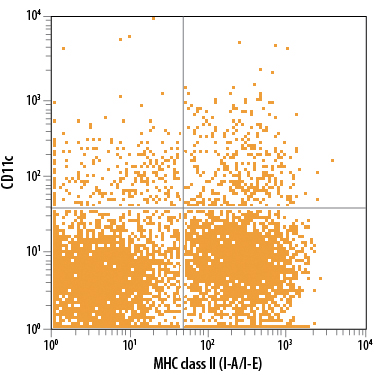Mouse CD11c Antibody Summary
Applications
Please Note: Optimal dilutions should be determined by each laboratory for each application. General Protocols are available in the Technical Information section on our website.
Scientific Data
 View Larger
View Larger
Detection of CD11c in Mouse Splenocytes by Flow Cytometry. Mouse splenocytes were stained with Hamster Anti-Mouse CD11c Monoclonal Antibody (Catalog # MAB69501) followed by Phycoerythrin-conjugated Anti-Hamster IgG Secondary Antibody (Catalog # F0120) and Rat Anti-Mouse MHC class II (I-A/I-E) APC-conjugated Monoclonal Antibody (Catalog # FAB6118A). Quadrant markers were set based on normal hamster IgG control antibody staining.
Reconstitution Calculator
Preparation and Storage
- 12 months from date of receipt, -20 to -70 °C as supplied.
- 1 month, 2 to 8 °C under sterile conditions after reconstitution.
- 6 months, -20 to -70 °C under sterile conditions after reconstitution.
Background: CD11c
CD11c, also known as the Integrin alpha X subunit, is a 150 kDa type I transmembrane protein that noncovalently heterodimerizes with the beta 2 subunit (CD18) to form alpha X/ beta 2, also known as p150/p95 and complement receptor type 4 (CR4). Integrin alpha X beta 2 is expressed on macrophages, dendritic cells, hairy cell leukemias and some other leukocyte subsets. The 1097 aa mouse CD11c extracellular domain shares 71% and 87% amino acid (aa) identity with human and rat CD11c, respectively. One potential alpha X isoform is truncated at aa 828. Some adhesion partners of alpha X beta 2 are shared with alpha M beta 2/CD11b/CD18 (Complement iC3b, ICAMs, vWF and Fibrinogen) while others (Osteopontin, Thy-1, Plasminogen, Heparin) are unique. Unlike alpha M beta 2, it is not constitutively active. alpha X beta 2 adhesion mediates proliferation, degranulation, chemotactic migration, and phagocytosis of complement-opsonized particles.
Product Datasheets
Citations for Mouse CD11c Antibody
R&D Systems personnel manually curate a database that contains references using R&D Systems products. The data collected includes not only links to publications in PubMed, but also provides information about sample types, species, and experimental conditions.
4
Citations: Showing 1 - 4
Filter your results:
Filter by:
-
Impact of CD200-Fc on dendritic cells in lupus-prone NZB/WF1 mice
Sci Rep, 2016-08-22;6(0):31874.
Species: Mouse
Sample Types: Whole Cells
Applications: Flow Cytometry -
In vivo adjuvant-induced mobilization and maturation of gut dendritic cells after oral administration of cholera toxin.
Authors: Anjuere F, Luci C, Lebens M, Rousseau D, Hervouet C, Milon G, Holmgren J, Ardavin C, Czerkinsky C
J Immunol, 2004-10-15;173(8):5103-11.
Species: Mouse
Sample Types: Whole Cells
Applications: FACS -
Heterogeneity of mouse spleen dendritic cells: in vivo phagocytic activity, expression of macrophage markers, and subpopulation turnover.
Authors: Leenen P, Radosevic K, Voerman J, Salomon B, Van Rooijen N, Klatzmann D, van Ewijk W
J Immunol, 1998-03-01;160(5):2166-73.
Species: Mouse
Sample Types: Whole Tissue
Applications: IHC -
Functional comparison of spleen dendritic cells and dendritic cells cultured in vitro from bone marrow precursors.
Authors: Garrigan K, Moroni-Rawson P, McMurray C, Hermans I, Abernethy N, Watson J, Ronchese F
Blood, 1996-11-01;88(9):3508-12.
Species: Mouse
Sample Types: Whole Cells
Applications: Flow Cytometry
FAQs
No product specific FAQs exist for this product, however you may
View all Antibody FAQsReviews for Mouse CD11c Antibody
There are currently no reviews for this product. Be the first to review Mouse CD11c Antibody and earn rewards!
Have you used Mouse CD11c Antibody?
Submit a review and receive an Amazon gift card.
$25/€18/£15/$25CAN/¥75 Yuan/¥2500 Yen for a review with an image
$10/€7/£6/$10 CAD/¥70 Yuan/¥1110 Yen for a review without an image



